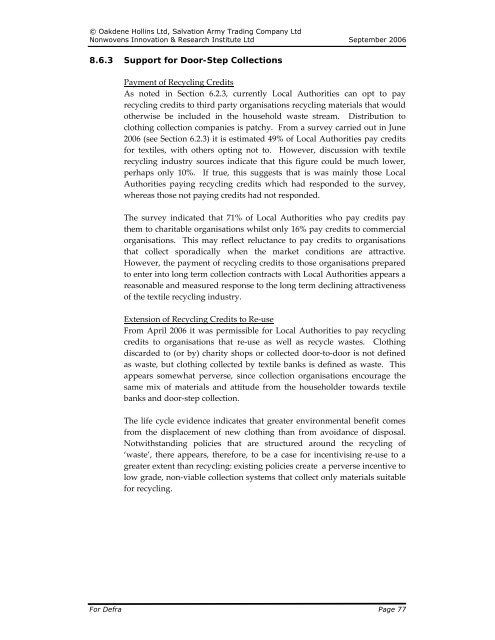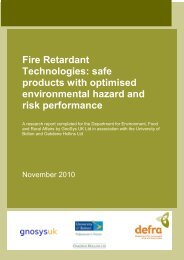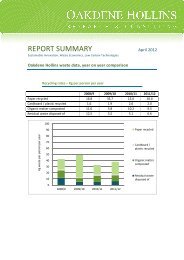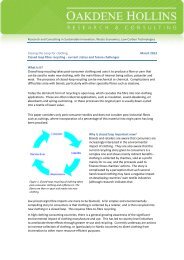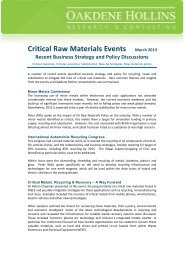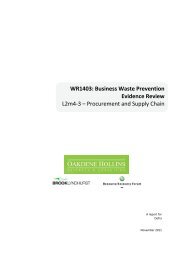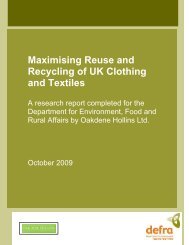Recycling of Low Grade Clothing Waste - Oakdene Hollins
Recycling of Low Grade Clothing Waste - Oakdene Hollins
Recycling of Low Grade Clothing Waste - Oakdene Hollins
You also want an ePaper? Increase the reach of your titles
YUMPU automatically turns print PDFs into web optimized ePapers that Google loves.
© <strong>Oakdene</strong> <strong>Hollins</strong> Ltd, Salvation Army Trading Company Ltd<br />
Nonwovens Innovation & Research Institute Ltd September 2006<br />
8.6.3 Support for Door-Step Collections<br />
Payment <strong>of</strong> <strong>Recycling</strong> Credits<br />
As noted in Section 6.2.3, currently Local Authorities can opt to pay<br />
recycling credits to third party organisations recycling materials that would<br />
otherwise be included in the household waste stream. Distribution to<br />
clothing collection companies is patchy. From a survey carried out in June<br />
2006 (see Section 6.2.3) it is estimated 49% <strong>of</strong> Local Authorities pay credits<br />
for textiles, with others opting not to. However, discussion with textile<br />
recycling industry sources indicate that this figure could be much lower,<br />
perhaps only 10%. If true, this suggests that is was mainly those Local<br />
Authorities paying recycling credits which had responded to the survey,<br />
whereas those not paying credits had not responded.<br />
The survey indicated that 71% <strong>of</strong> Local Authorities who pay credits pay<br />
them to charitable organisations whilst only 16% pay credits to commercial<br />
organisations. This may reflect reluctance to pay credits to organisations<br />
that collect sporadically when the market conditions are attractive.<br />
However, the payment <strong>of</strong> recycling credits to those organisations prepared<br />
to enter into long term collection contracts with Local Authorities appears a<br />
reasonable and measured response to the long term declining attractiveness<br />
<strong>of</strong> the textile recycling industry.<br />
Extension <strong>of</strong> <strong>Recycling</strong> Credits to Re‐use<br />
From April 2006 it was permissible for Local Authorities to pay recycling<br />
credits to organisations that re‐use as well as recycle wastes. <strong>Clothing</strong><br />
discarded to (or by) charity shops or collected door‐to‐door is not defined<br />
as waste, but clothing collected by textile banks is defined as waste. This<br />
appears somewhat perverse, since collection organisations encourage the<br />
same mix <strong>of</strong> materials and attitude from the householder towards textile<br />
banks and door‐step collection.<br />
The life cycle evidence indicates that greater environmental benefit comes<br />
from the displacement <strong>of</strong> new clothing than from avoidance <strong>of</strong> disposal.<br />
Notwithstanding policies that are structured around the recycling <strong>of</strong><br />
‘waste’, there appears, therefore, to be a case for incentivising re‐use to a<br />
greater extent than recycling: existing policies create a perverse incentive to<br />
low grade, non‐viable collection systems that collect only materials suitable<br />
for recycling.<br />
For Defra Page 77


